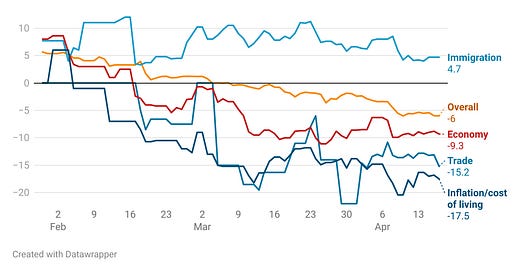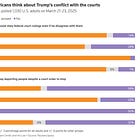Should Democrats focus on immigration or the economy?
It is possible for parties to walk and chew gum at the same time
This is a short bonus post for Friday, April 18, 2025. See this morning's COTW for data that is relevant to this discussion. I do not intend for this to be a long discussion or a back-and-forth, but I wanted to react to a trend I think is troubling.
I have seen political analysts suggest or imply a few times now that Democrats should not be trying to fight Republicans on immigration in general, and advocate for Kilmar Abrego Garcia in particular, because the rough GOP stance on deportations is popular.
Some have come out to make this case forthrightly, while others have simply hinted at their point or otherwise made a tangential argument on social media. Matt Yglesias, for instance, has taken the stance that “people who post about politics on social media should talk about immigration if they want to, but should be mindful of downside to making it more salient.” I think this specific framing suffers from fewer problems than the “either immigration or economics” one, but still falls into the traps of 1, 3, 4 and 5 below, so I’m lumping these together for purposes of this post.
I guess the logic for these arguments is straightforward enough: The current state of the economy is a 20-ton anchor tied around Trump's neck, while his approval on immigration is net positive. Pick your battles, a strategist might advise; Voters only have a certain amount of attention and you want to maximize their positive impression of you. Thus, talk about the economy and not immigration, or “do what you want but be mindful of the consequences” in the Yglesias version.
However, the people advancing this argument are making at least five mistakes:
1. Overall issue popularity is not the same as the popularity of particulars
The biggest problem with the argument is that it presupposes that Trump's topline immigration approval is a perfect mapping of public opinion onto the more narrow policy proposals and issues at play. But as I showed in my immigration article on Tuesday, the individual components of Trump's immigration agenda are much less popular than the general ideas of securing the border or deporting undocumented immigrants.
In polls of Trump's immigration policy, voters generally oppose deporting residents who have been in America for more than ~5 years, deporting people where it would separate children from parents, and deporting people who have not been convicted of crimes other than illegal entry. I encourage you to go read the piece if you haven't already:
One note when analyzing these data is that we don't yet have specific poll questions about the extrajudicial deportation of and refusal to return Kilmar Abrego Garcia, but I suspect they will land closer to the support for deporting lawful residents than Trump's overall issue approval on immigration.
2. The case implicitly assumes a party can’t do 2+ things at once.
The most straightforward error in the image-maximization framework is assuming that parties can only compete on one dimension of issue salience. I have heard this a lot from certain party strategists but have never seen evidence for it. For one thing, given the oversupply of (pick 2) politicians, media coverage, and social media posters, it is possible for parties to push messages on two issues at once; They can walk and chew gum at the same time.
Take Trump's 2016 campaign, for instance. The most salient issues were (a) the economy and (b) immigration (unsurprisingly, the same issues relevant right now). It's true that Trump focused much of his stump-speech rhetoric on the latter, but that did not come at the exclusion of the former. One theory from the campaign at the time was that the former takes care of messaging itself, so you don't need to focus on it as much, but Trump smartly didn't ignore inflation entirely.
Anyway, I'd love to see evidence here. The political science research suggests bigger parties normally focus on more than one issue, since they have plenty of resources, and I think that applies here too. Other evidence finds that spatial voting is a function of both agreement and issue salience, but crucially, salience does not trade off exclusively between issues. It is possible to raise the salience of multiple issues at once.
3. Opinion changes with new information and arguments from party leaders
This is another obvious point that I feel compelled to make since I haven't really seen it out in the wild, and that is this: Public opinion can change based on new information and engagement from party leaders! Trump's approval on immigration policy in general has fallen from about +10 last month to +5 today. No doubt part of that decline is the general trend down in his approval rating, but another component may very well be the increasing salience of the particular components of his immigration policy that are most unpopular.
One direct comparison for this moment comes from 2017-2018. Immigration issue ownership shifted toward Democrats during Trump's first term, for example, after the Trump administration ramped up the government's existing family separation policy.
Party issue ownership is known to shift over time as conditions and ruling parties change. This is because voters respond to cues from their leaders and the eventual evidence we receive on the success of certain policies. There is no reason to expect that Republicans will continue to lead on immigration if Democrats message on it.
Where I come from, they call this “politics."
4. Problems can be tied together with broader themes
Penultimately, I will touch on one aspect of how to craft party messaging, and that is to tie multiple violations of the general will together in a neat little package for the disengaged voters you're trying to move.
One way to focus messaging on both the economy and immigration, for example, might be to show how unchecked executive power is dangerous. After all the most unpopular parts of Trump's agenda --- tariffs and deportations for undocumented migrants who have been here a long time and committed no crimes --- are a direct result of executive overreach.
The power that gives Trump the ability to levy extreme tariffs was given to the president when Congress expected him to be forgiving of tariffs on an individual basis as a act of diplomacy, not to plunge the world economic order into crisis. Similarly, the judiciary has said Trump's deporting of Abrego Garcia, as well as hundreds of Venezuelans, runs afoul of multiple Court orders.
So, anyway, there are creative ways to combine messages on multiple issues to deliver multiple messages more efficiently. The binary presented online is a false choice.
5. Politics is about values
A final issue is that image maximization is not the only product of politics and party competition. At a fundamental level, a party that believes in democracy and the rule of law cannot let the other side defy a 9-0 Supreme Court order. This is because politics is an aggregation of and an abstraction layer sitting above our beliefs and values.
And hey, the messaging here that Trump is trying to "violate the Constitution," for example, might play well anyway. You never know if you don't try.






To me this is not about immigration but about the rule of law, and in particular due process. The 14th amendment states:
"nor shall any State deprive any person of life, liberty, or property, without due process of law; nor deny to any person within its jurisdiction the equal protection of the laws."
It is obvious that the Trump administration is grossly in violation of this. The democrats should continue to hammer that in.
Good points, even if some are (or should be) obvious. Another one I’d like to make but is hard to prove is that while winning the votes of moderates is an important part of winning elections, the finger-in-the-wind sort of moderation doesn’t actually win their votes. Personality and vibes matter, and a complete lack of conviction and courage doesn’t play nearly as well as the popularists wish it does.